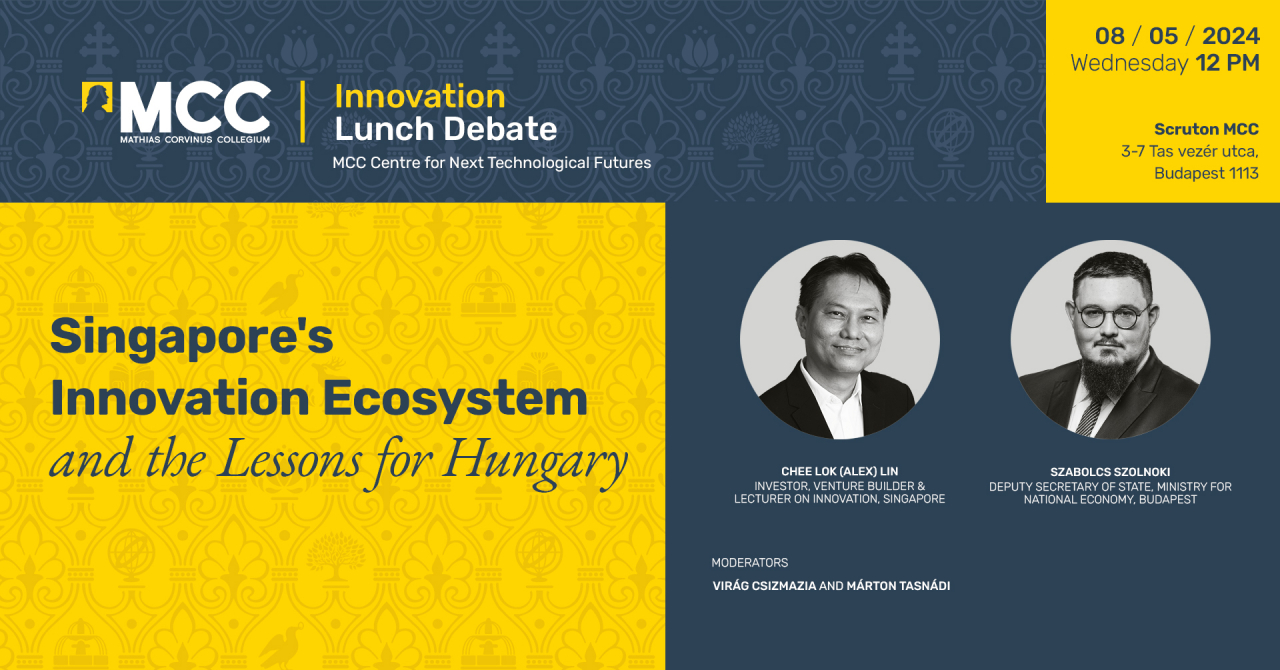Lecturers:
- Chee Lok (Alex) Lin, investor, venture builder & lecturer on innovation, Singapore
- Szabolcs Szolnoki, Deputy Sceretary of State, Ministry for National Economy, Budapest
Date: 2024. május 8. (Wednesday) - 12:00 PM
Venue: Scruton MCC - 1113 Budapestre, Vezér Street 3-7.
About the programme:
Singapore’s journey from a traditional trade and finance hub to a global leader in technological innovation is a captivating case study for business and policy school students. The key to this transformation lies in the strategic use of startup accelerators, a unique feature of Singapore’s innovation ecosystem. These accelerators have not only nurtured a multitude of Series-A investable startups but also attracted a diverse range of stakeholders, including entrepreneurs, universities, venture capitalists, the government, and large corporations.
At the heart of Singapore's success is its substantial prior investment in innovation R&D, which has laid a robust foundation for current developments. This approach illustrates Singapore's adaptability and forward-thinking strategy, enabling the country to pivot towards areas like digitalization and tech innovation, thus ensuring sustained economic growth beyond its established trade status.
The most intriguing aspect of Singapore’s success story is the comprehensive ecosystem approach championed by the government. Unlike corporate transformations, reshaping a country’s industrial direction involves aligning diverse and independent stakeholders with varying objectives and expectations. Singapore’s model, driven by the government, creates an environment where all parties can contribute to and benefit from the ecosystem. This approach, a blend of strategic vision and practical implementation, positions Singapore as a participant and a leader in the global innovation landscape.
However, this sparks a central debate: Can Singapore's model be replicated in less resourceful countries? Singapore's status as a developed nation provides inherent advantages, including access to capital and a rich talent pool. These resources are less readily available in developing nations, which raises questions about the scalability and adaptability of the Singaporean model elsewhere.
For emerging economies aspiring to replicate Singapore’s success, the key lies in adapting and customizing this model to suit their unique socio-economic contexts. The use of newer technologies and innovative approaches could be instrumental. For example, digital platforms can democratize access to educational and financial resources, reducing the initial need for heavy investments. Governments in these countries could foster a culture of innovation by implementing supportive policies, facilitating technology transfer, and encouraging entrepreneurship at the grassroots level.
Furthermore, international collaboration and partnerships can play a significant role. Emerging economies can attract foreign investments and knowledge by creating favorable business environments and ensuring political stability. Additionally, adopting a phased approach, starting with small-scale pilot projects to build capabilities and learn from them, could pave the way for broader implementation.
The discussion about Singapore's innovation ecosystem is not just academic but vitally relevant to policymakers, entrepreneurs, and educators worldwide. It challenges us to think critically about how innovation models can be adapted and scaled across different environments to foster global economic development and technological advancement.
This debate is an excellent opportunity for students to explore the interplay between government policy, economic strategy, and technological innovation in shaping the competitive edge of nations. It invites us to consider the broader implications of Singapore's success and how these lessons can be contextualized to benefit other regions, particularly those with limited resources but unlimited aspirations.


